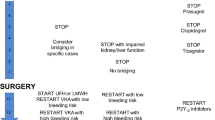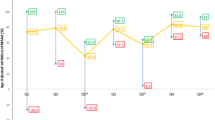Abstract
Widespread adoption of the antiplatelet agents into everyday clinical practice has revolutionized contemporary care of the cardiovascular patient. Major adverse cardiovascular events including death, myocardial infarction, stroke, and recurrent angina have all been shown to be significantly decreased when these agents are employed in the treatment of coronary atherosclerosis, acute coronary syndromes, myocardial infarction, and in the setting of percutaneous coronary intervention. As a growing number of patients on antiplatelet therapy are undergoing various surgical procedures, the potential risks and benefits these drugs pose perioperatively will become increasingly important. Available data indicate that, when used appropriately, these drugs can be used safely prior to surgery. Efficacy in improving surgical outcomes and in preventing adverse cardiovascular events postoperatively has also been demonstrated. The purpose of this review is to examine the perioperative safety and efficacy of the most widely used antiplatelet agents: aspirin; the thienopyridine clopidogrel; and the glycoprotein (GP) IIb/IIIa inhibitors abciximab, eptifibatide, and tirofiban. This information, coupled with emerging platelet monitoring techniques, may help provide additional assistance to the clinician to manage therapy and guide appropriate timing of both cardiac and noncardiac surgery.
Similar content being viewed by others
References
Website. Heart and Stroke Statistical Update. American Heart Association, 2001.
Antithrombotic Trialists' Collaboration. Collaborative meta-analysis of randomised trials of antiplatelet therapy for prevention of death, myocardial infarction, and stroke in high risk patients. BMJ2002;324:71–86.
O'Brien JR. Effect of salicylates on human platelets. Lancet1968;1:1431.
Zucker M, Rothwell K. Differential influences of salicylate compounds on platelet aggregation and serotonin release. Curr Ther Res1978;23:194–199.
Ridker PM, Manson JE, Gaziano JM, Buring JE, Hennekens CH. Low-dose aspirin therapy for chronic stable angina. A randomized, placebo-controlled clinical trial. Ann Intern Med1991;114:835–839.
Steering Committee of the Physicians' Health Study Research Group. Final report on the aspirin component of the ongoing physicians' health study. N Engl J Med1989;321:129–135.
Antiplatelet Trialists' Collaboration. Collaborative over-view of randomised trials of antiplatelet therapy—I: prevention of death, myocardial infarction, and stroke by prolonged antiplatelet therapy in various categories of patients. BMJ1994;308:81–106.
ISIS-2 Collaborative Group. Randomised trial of intravenous streptokinase, oral aspirin, both, or neither among 17187 cases of suspected acute myocardial infarction. Lancet1988;2:349–360.
Patrono C, Ciabattoni G, Pinca E, et al. Low dose aspirin and inhibition of thromboxane B2 production in healthy subjects. Thromb Res1980;17:317–327.
Kitchen L, Erichson RB, Sideropoulos H. Effect of drug-induced platelet dysfunction on surgical bleeding. Am J Surg1982;143:215–217.
Watson CJE, Deane AM, Doyle PT, Bullock KN. Identifiable factors in post-prostatectomy haemorrhage: the role of aspirin. British Journal of Urology1990;66:85–87.
Lawrence C, Sakuntabhai A, Tiling-Grosse S. Effect of aspirin and nonsteroidal antiinflammatory drug therapy on bleeding complications in dermatologic surgical patients. Journal of the American Academy of Dermatology1994;31:988–992.
Ferraris VA, Swanson E. Aspirin usage and perioperative blood loss in patients undergoing unexpected operations. Surgery, Gynecology, and Obstetrics1983;156:439–442.
Horlocker TT, Wedel DJ, Schroeder DR, et al. Preoperative antiplatelet therapy does not increase the risk of spinal hematoma associated with regional anesthesia. Anesth Analg1995;80:303–309.
Michelson EL, Morganroth J, Torosian M, MacVaugh III H. Relation of preoperative use of aspirin to increased mediastinal blood loss after coronary artery bypass graft surgery. The Journal of Thoracic and Cardiovascular Surgery1978;76:694–697.
Torosian M, Michelson EL, Morganroth J, MacVaugh H, 3rd. Aspirin-and coumadin-related bleeding after coronary-artery bypass graft surgery. Ann Intern Med1978;89:325–328.
Ferraris VA, Ferraris SP, Lough FC, Berry WR. Preoperative aspirin ingestion increases operative blood loss after coronary artery bypass grafting. Annals of Thoracic Surgery1988;45:71–74.
Sethi GK, Copeland JG, Goldman S, Moritz T, Zadina K, Henderson WG. Implications of preoperative administration of aspirin in patients undergoing coronary artery bypass grafting. Department of Veterans affairs cooperative study on antiplatelet therapy. J Am Coll Cardiol1990;15:15–20.
Goldman S, Copeland J, Moritz T, et al. Improvement in early saphenous vein graft patency after coronary artery bypass surgery with antiplatelet therapy: results of a veterans administration cooperative study. Circulation1988;77:1324–1332.
Willard JE, Lange RA, Hillis LD. The use of aspirin in ischemic heart disease. N Engl J Med1992;327:175–181.
Gavaghan TP, Gebski V, Baron DW. Immediate postoperative aspirin improves vein graft patency early and late after coronary artery bypass graft surgery. Circulation1991;83:1526–1533.
Goldman S, Copeland J, Moritz T, et al. Saphenous vein graft patency 1 year after coronary artery bypass surgery and effects of antiplatelet therapy. Results of a veterans administration cooperative study. Circulation1989;80:1190–1197.
Stein PD, Dalen JE, Goldman S, Theroux P. Antithrombotic therapy in patients with saphenous vein and internal mammary artery bypass grafts. Chest2001;119:278S–282S.
Antiplatelet Trialists' Collaboration. Collaborative overview of randomised trials of antiplatelet therapy—II: maintenance of vascular graft or arterial patency by antiplatelet therapy. BMJ1994;308:159–168.
Jackson MR, Clagett GP. Antithrombotic therapy in peripheral arterial occlusive disease. Chest2001;119:283S–299S.
Lindblad B, Persson NH, Takolander R, Bergqvist D. Does low-dose acetylsalicylic acid prevent stroke after carotid surgery? A double-blind, placebo-controlled randomized trial. Stroke1993;24:1125–1128.
Berger PB. Oral antiplatelet agents: aspirin, ticlopidine, clopidogrel, cilostazol, and the oral glycoprotein IIb/IIIa inhibitors. In: Topol E, Ed. Acute Coronary Syndromes, 2nd edn. New York: Marcel Dekker, 2001:453–497.
CAPRIE Steering Committee. A randomised, blinded trial of Clopidogrel versus Aspirin in Patients at Risk of Ischaemic Events (CAPRIE). Lancet1996;348:1329–1339.
Bhatt DL, Bertrand ME, Berger PB, et al. Meta-analysis of randomized and registry comparisons of ticlopidine with clopidogrel after stenting. Journal of the American College of Cardiology2002;39:9–14.
Weber A-A, Braun M, Hohlfeld T, Schwippert B, Tschope D, Schror K. Recovery of platelet function after discontinuation of clopidogrel treatment in healthy volunteers. British Journal of Clinical Pharmacology2001;52:333–336.
Caliendo G, Bradbury K, Mehl B. Ticlopidine, bleeding, and surgery. Mt Sinai J Med1994;61:372–373.
Criado A, Juffe A, Carmona J, Otero C, Avello F. Ticlopidine as a hemorrhagic risk factor in coronary surgery. Drug Intell Clin Pharm1985;19:673–676.
Grubitzsch H, Wollert H-G, Eckel L. Emergency coronary artery bypass grafting: Does excessive preoperative anti-coagulation increase bleeding complications and transfusion requirements? Cardiovascular Surgery2001;9:510–516.
The CURE Investigators. Effects of clopidogrel in addition to aspirin in patients with acute coronary syndromes with-out ST-segment elevation. The New England Journal of Medicine2001;345:494–502.
Yende S, Wunderink RG. Effect of clopidogrel on bleeding after coronary artery bypass surgery. Crit Care Med2001;29:2271–2275.
Chevigne M, David JL, Rigo P, Limet R. Effect of ticlopidine on saphenous vein bypass patency rates: a double-blind study. Ann Thorac Surg1984;37:371–378.
Limet R, David JL, Magotteaux P, Larock MP, Rigo P. Prevention of aorta-coronary bypass graft occlusion. Beneficial effect of ticlopidine on early and late patency rates of venous coronary bypass grafts: a double-blind study. J Thorac Cardiovasc Surg1987;94:773–783.
Becquemin JP. Effect of ticlopidine on the long-term patency of saphenous-vein bypass grafts in the legs. Etude de la Ticlopidine apres Pontage Femoro-Poplite and the Association Universitaire de Recherche en Chirurgie. N Engl J Med1997;337:1726–1731.
Bhatt DL, Chew DP, Hirsch AT, Ringleb PA, Hacke W, Topol EJ. Superiority of clopidogrel versus aspirin in patients with prior cardiac surgery. Circulation2001; 103:363–368.
Sreeram GM, Sharma AD, Slaughter TF. Platelet glyco-protein IIb/IIIa antagonists: perioperative implications. J Cardiothorac Vasc Anesth2001;15:237–240.
Patrono C, Coller B, Dalen JE, et al. Platelet-active drugs: the relationships among dose, effectiveness, and side effects. Chest2001;119:39S–63S.
Waters JH, Anthony DG, Gottlieb A, Sprung J. Bleeding in a patient receiving platelet aggregation inhibitors. Anesth Analg2001;93:878–882.
Gammie JS, Zenati M, Kormos RL, et al. Abciximab and excessive bleeding in patients undergoing emergency cardiac operations. Ann Thorac Surg1998;65:465–469.
Boehrer JD, Kereiakes DJ, Navetta FI, Califf RM, Topol EJ. Effects of profound platelet inhibition with c7E3 before coronary angioplasty on complications of coronary by-pass surgery. EPIC Investigators. Evaluation Prevention of Ischemic Complications. Am J Cardiol1994;74:1166–1170.
Juergens CP, Yeung AC, Oesterle SN. Routine platelet transfusion in patients undergoing emergency coronary bypass surgery after receiving abciximab. Am J Cardiol1997;80:74–75.
Lincoff AM, LeNarz LA, Despotis GJ, et al. Abciximab and bleeding during coronary surgery: results from the EPILOG and EPISTENT trials. Improve long-term out-come with abciximab GP IIb/IIIa blockade. Evaluation of platelet IIb/IIIa Inhibition in STENTing. Ann Thorac Surg2000;70:516–526.
Dyke CM, Bhatia D, Lorenz TJ, et al. Immediate coronary artery bypass surgery after platelet inhibition with eptifibatide: results from PURSUIT. Platelet glycoprotein IIb/IIIa in unstable angina: Receptor suppression using integrelin therapy. Ann Thorac Surg2000;70:866–871; discussion 871- 872.
Genoni M, Zeller D, Bertel O, Maloigne M, Turina M. Tirofiban therapy does not increase the risk of hemorrhage after emergency coronary surgery. J Thorac Cardiovasc Surg2001;122:630–632.
Marso SP, Bhatt DL, Roe MT, et al. Enhanced efficacy of eptifibatide administration in patients with acute coronary syndrome requiring in-hospital coronary artery bypass grafting. PURSUIT Investigators. Circulation2000;102:2952–2958.
Barr E, Thornton AR, Sax FL, Snapinn SM, Theroux P. Benefit of tirofiban plus heparin therapy in unstable angina/non-Q-wave myocardial infarction patients is observed regardless of interventional treatment strategy. Circulation1998;98:I-504.
Suzuki Y, Hillyer P, Miyamoto S, et al. Integrilin prevents prolonged bleeding times after cardiopulmonary bypass. Ann Thorac Surg1998;66:373–381.
Steinhubl SR, Talley JD, Braden GA, et al. Point-of-care measured platelet inhibition correlates with a reduced risk of an adverse cardiac event after percutaneous coronary intervention: results of the GOLD (AU-Assessing Ultegra) multicenter study. Circulation2001;103:2572–2578.
Mukherjee D, Moliterno DJ. Bedside platelet monitoring. In: Topol E, Ed. Acute Coronary Syndromes. New York: Marcel Dekker, 2001:563–597.
Lorenz RL, Schacky CV, Weber M, et al. Improved aortocoronary bypass patency by low-dose aspirin (100 mg daily): effects on platelet aggregation and thromboxane formation. Lancet1984;1(8389):1261–1264.
Brown BG, Cukingnan RA, DeRouen T, et al. Improved graft patency in patients treated with platelet-inhibiting therapy after coronary bypass surgery. Circulation1985; 72(1):138–146.
Sharma GVRK, Khuri SF, Josa M, Folland ED, Parisi AF. The effect of antiplatelet therapy on saphenous vein coronary artery bypass graft patency. Circulation1983;68: (Suppl II):II218–II222.
McEnany MT, Salzman EW, Mundth ED, et al. The effect of antithrombotic therapy on patency rates of saphenous vein coronary artery bypass grafts. J Thorac Cardiovasc Surg1982;83:81–89.
Author information
Authors and Affiliations
Rights and permissions
About this article
Cite this article
Merritt, J.C., Bhatt, D.L. The Efficacy and Safety of Perioperative Antiplatelet Therapy. J Thromb Thrombolysis 13, 97–103 (2002). https://doi.org/10.1023/A:1016298831074
Issue Date:
DOI: https://doi.org/10.1023/A:1016298831074




